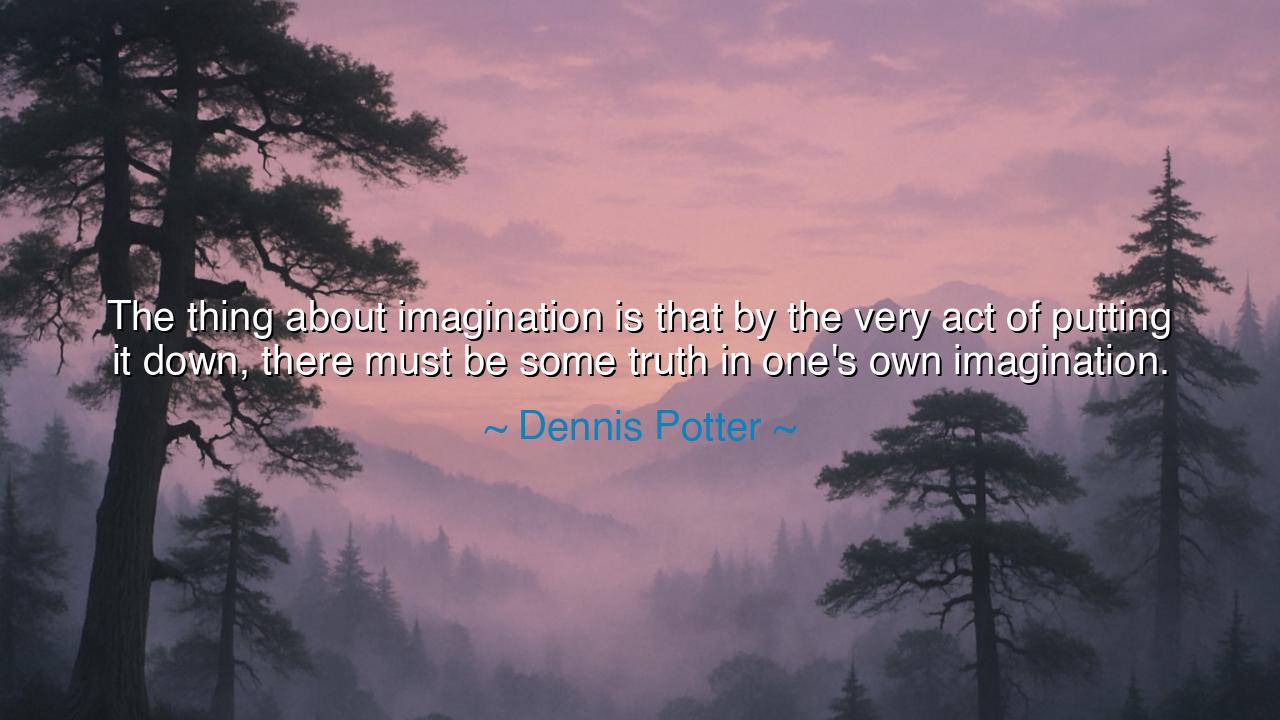
The thing about imagination is that by the very act of putting it
The thing about imagination is that by the very act of putting it down, there must be some truth in one's own imagination.






“The thing about imagination is that by the very act of putting it down, there must be some truth in one’s own imagination.” Thus spoke Dennis Potter, the playwright of dreams and contradictions, who saw in the imagination not escape, but revelation. His words pierce to the heart of creation: that even the most fanciful vision, once brought into the world, carries within it a fragment of truth — not necessarily of the outer world, but of the inner self. When one dares to imagine and then gives shape to that imagination — in words, in art, in action — one unveils not falsehood, but the essence of one’s own being.
In the age of the ancients, it was said that the poet did not invent but remembered — that imagination was a form of remembrance, a reawakening of truths hidden within the soul. Plato spoke of the artist as one touched by divine madness, who glimpses eternal forms and translates them into mortal language. Potter, though writing in a modern world of reason and irony, stands in that same lineage. When he speaks of truth within imagination, he reminds us that what we create, even when cloaked in fiction, is drawn from the well of our lived experience — our fears, our loves, our longings. Every image we “put down” bears the fingerprint of our truth, however disguised.
For to imagine is to reveal what one values, what one aches for, what one believes possible. The act of creation — of writing, painting, dreaming aloud — is not a mask that hides us, but a mirror that exposes us. Potter, who often wrestled with illness and mortality, poured into his work a haunting blend of fantasy and pain. His surreal worlds were not unreal; they were his soul made visible. Thus, he teaches that the imagination does not lie. It may distort, it may exaggerate, it may dream — but even in its wildest inventions, it is faithful to the emotional truth of the one who dreams.
Consider Franz Kafka, who filled his stories with impossible transformations — a man turned into an insect, a world ruled by invisible judges. None of these things happened in the world of fact, yet they are true beyond question. They tell the truth of alienation, of despair, of man’s futile search for justice. Through his imagination, Kafka revealed what no report or statistic ever could. The worlds he “put down” were inventions — yet within them lay the pulse of his own truth. This is what Potter means: that even fantasy, once written, becomes confession.
And this is why the ancients revered the imagination as sacred. It was not a plaything of the mind, but a bridge between the visible and invisible, between man and the divine. The myths of Greece, the parables of the prophets, the epics of every age — all were born from imagination, yet each carried truth in their bones. When Homer sang of Achilles, he was not chronicling history; he was unveiling the truth of rage, honor, and mortality. When Potter writes of dream and reality intertwined, he continues this same ancient labor — the revelation of the human soul through the act of imaginative creation.
But there is also humility in his words. For when we “put down” our imagination, whether in art or in speech, we must face what it reveals of us. The truth it carries is not always comfortable. It may expose our fears, our selfishness, our hidden wounds. Yet it is through that confrontation that we grow. To create is to meet oneself — to find that the imagination, far from being a playground of illusion, is a teacher of the most intimate truths. The artist does not invent meaning; he discovers it, hidden within his own heart.
The lesson, then, is both profound and practical: honor your imagination. Do not dismiss your daydreams as folly or your creative visions as meaningless. When you write, paint, design, or dream, attend to what your imagination is trying to tell you. Ask: what truth lies within this vision? What longing, what fear, what hope speaks through it? For as Dennis Potter reminds us, the moment you bring your imagination into form — the moment you “put it down” — it ceases to be mere fancy. It becomes a reflection of your truth, a revelation of who you are and what you believe life to be.
So, my friends, cherish this divine faculty that dwells within every soul. Let your imagination speak freely, and do not fear what it reveals. For truth does not live only in the cold light of logic, but in the warm fire of imaginative creation. Every vision you bring forth — no matter how strange or dreamlike — is a thread of your inner reality woven into the tapestry of the world. And perhaps, in the end, that is the greatest act of courage: to face the horror and the holiness of one’s own imagination, and to find, within it, the undeniable truth of being alive.






AAdministratorAdministrator
Welcome, honored guests. Please leave a comment, we will respond soon